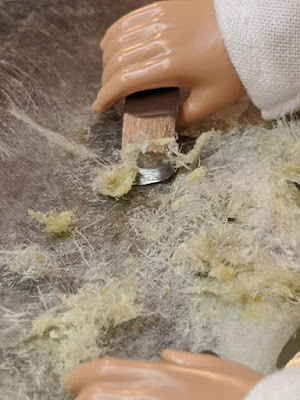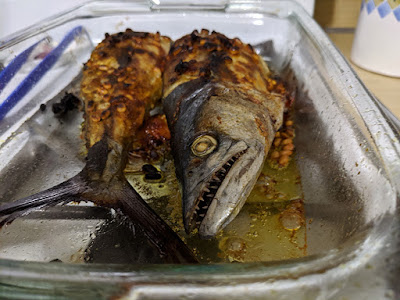Translation of "Der Pressbengel," from
Der Buchbinderlehrling, vol, 13, nr, 11, 1940.
By Schlaghammer (beating hammer), pseudonym for Franz Weisse.
For more about Weisse, see also the bottom of his
story about a bone folder.
 |
| A Pressbengel from my collection. |
Once upon a time, there was Pressbengel that was very busy during the day, so busy that the Journeyman threw it into a corner with a groan from all the effort and left it there until the next morning. The Pressbengel sensed that the Journeyman felt it had become an outdated piece of bindery furniture, and that it was easier and more comfortable to use a tabletop iron press rather than the traditional hand press. Add to this that the Journeyman wanted to go to a party that night, and who knew if he would even be fit to work the next morning. The nature of his situation depressed the Pressbengel to no end, and it began to brood about its role in, and importance for the bindery.
 |
Illustration from Adam, Lehrbücher der Buchbinderei:
Die einfachen handwerksmässigen Buchbinderarbeiten
ohne Zuhilfenahme von Maschinen (1924) |
Didn’t the Journeymen, as well as an otherwise gentle young lady, break and glue it back together three times in their zeal to tightly back their books? Yes, they did! No one, whether apprentice or Meister gave the Pressbengel, and the pain they inflicted on it, a second thought. They all treated it pitifully, such as when the apprentices didn’t lubricate the wooden threads of the press with dry soap so that its job would be easier than on the rough, dry wood that wouldn’t allow the nut to turn. Then the louts would just bang on it with a hammer until it broke. The Meister was too cheap to buy a new one, choosing instead to just glue it back together until the next time. After flying across the shop, the Pressbengel finally had enough, and came up with a prank that he was going to play on the Journeyman.
 |
| Cover from one of the later editions of Ernst Collin's Buchbinderei für den Hausbedarf. |
Early the next morning, after the Journeyman had finally collapsed into his bed after the night of debauchery and drinking, the Pressbengel came up to him and hit him, first in the gut, then the chest, and finally on the head, repeatedly. The Journeyman twisted and turned, but try as he may, he could not avoid the repeated blows to his brow. “I’ll teach you, you vile Journeyman, to abuse me! For ten years I’ve served you and the others, and it’s been 30 years since the Meister bought me. Millions of presses I’ve tightened for you! And, this is how you thank me?!? Just you wait! Payback is coming.
The Journeyman avoided the bindery for eight days on account of the horrible headache induced by his “dream.” His first glance was towards the corner that he had tossed the Pressbengel into in anger. The Pressbengel, however, did its duty in the Meister’s hands, squealing in delight at the sight of the pathetic looking Journeyman – “see there are still lots of tasks in bookbinding that handpresses are essential for! When in your hands, I, ‘Herr Pressbengel,’ help you tighten those screws. Me, ‘Herr Pressbengel to you!’ Your bindings would be junk if you didn’t have me! Hand bound books are supposed to be solid as a piece of wood, and without me they would be floppy and unsightly lumps. So, Herr Journeyman, won't you treat me better? If not, I’ll visit you again in the middle of the night, but this time along with someone who’ll beat some real sense into you, the
beating hammer!"


















